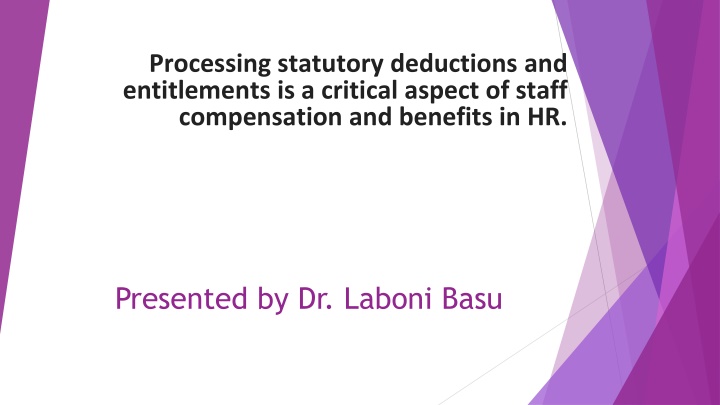
Managing Statutory Deductions and Entitlements in HR
Processing statutory deductions and entitlements is crucial in HR compensation and benefits. Understand applicable laws, calculate deductions accurately, and manage retirement contributions diligently to ensure compliance and employee financial security.
Download Presentation

Please find below an Image/Link to download the presentation.
The content on the website is provided AS IS for your information and personal use only. It may not be sold, licensed, or shared on other websites without obtaining consent from the author. If you encounter any issues during the download, it is possible that the publisher has removed the file from their server.
You are allowed to download the files provided on this website for personal or commercial use, subject to the condition that they are used lawfully. All files are the property of their respective owners.
The content on the website is provided AS IS for your information and personal use only. It may not be sold, licensed, or shared on other websites without obtaining consent from the author.
E N D
Presentation Transcript
Processing statutory deductions and entitlements is a critical aspect of staff compensation and benefits in HR. Presented by Dr. Laboni Basu
Processing statutory deductions and entitlements is a critical aspect of staff compensation and benefits in HR. Processing statutory deductions and entitlements is a critical aspect of staff compensation and benefits in HR. It involves managing various legal and regulatory requirements related to Taxes Insurance Retirement benefits, and other mandatory deductions and entitlements
Processing statutory deductions and entitlements is a critical aspect of staff compensation and benefits in HR. Understand the Applicable Laws and Regulations: The first step is to familiarize yourself with the relevant tax laws, employment regulations, requirements that govern employee compensation and benefits. This includes understanding federal and state income tax laws, social security contributions, Medicare deductions, unemployment insurance, workers' compensation, and any other applicable regulations. and other statutory
Processing statutory deductions and entitlements is a critical aspect of staff compensation and benefits in HR. Calculate and Withhold Statutory Deductions: HR professionals must withhold statutory deductions paychecks in compliance with the applicable laws and regulations. This includes federal and state income taxes, social security contributions, Medicare taxes, and any other mandatory deductions mandated by the government. The calculations should be based on the employee's earnings, filing status, and other relevant factors. accurately calculate from and employees'
Processing statutory deductions and entitlements is a critical aspect of staff compensation and benefits in HR. Manage Retirement and Pension Contributions: HR is responsible for managing employee contributions to retirement plans such as 401(k), pension schemes, or other retirement savings programs. This involves ensuring that employee contributions are deducted correctly from their paychecks and forwarded to the appropriate retirement savings account or fund. Additionally, HR must also oversee any employer matching contributions as per the company's policy.
Processing statutory deductions and entitlements is a critical aspect of staff compensation and benefits in HR. Administer Insurance Premiums and Benefits: HR oversees the administration of insurance premiums and benefits, including health insurance, dental, vision, life insurance, and disability coverage. This involves deducting employee premiums from their paychecks and coordinating with insurance providers to ensure that employees are enrolled in the appropriate insurance plans. HR also manages any employer-sponsored insurance benefits, such as contributions to employee health savings accounts (HSAs) or flexible spending accounts (FSAs).
Processing statutory deductions and entitlements is a critical aspect of staff compensation and benefits in HR. Handle Other Entitlements and Deductions: In addition to taxes, retirement contributions, and insurance premiums, HR entitlements and deductions such as garnishments, child support orders, and other court-ordered payments. It is essential to accurately process and remit these deductions while complying with legal requirements and court orders. manages other statutory
Processing statutory deductions and entitlements is a critical aspect of staff compensation and benefits in HR. Maintain Accurate Records and Reporting: HR maintains comprehensive statutory deductions and entitlements for each employee. This includes accurate payroll records, tax filings, insurance enrollments, retirement plan contributions, and other relevant documentation. HR is also responsible for preparing and filing necessary reports with government agencies and ensuring compliance with all reporting requirements. records of all
Processing statutory deductions and entitlements is a critical aspect of staff compensation and benefits in HR. Stay Updated on Regulatory Changes: HR professionals must stay abreast of any changes in tax laws, insurance regulations, retirement plan requirements, and other statutory obligations. This includes monitoring updates from the IRS, Department of Labor, and other regulatory bodies to ensure that the organization remains compliant with all legal requirements.
Conclusion In conclusion, processing statutory deductions and entitlements in HR involves a detailed and meticulous approach to compliance with legal and regulatory requirements. By understanding and adhering to these procedures, HR departments can compensation and benefits are managed in a compliant and ethical manner. ensure that employees'






















